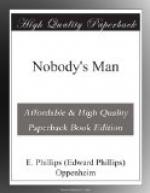She sighed.
“Then I am afraid he must go down,” she said. “He simply stands in the way of better men.”
“One reads a good deal of Mr. Tallente, nowadays,” Segerson remarked, changing the conversation a little abruptly.
Jane leaned over and stroked the head of a dog which had come to lie at her feet.
“He seems to be making a good deal of stir,” she observed.
The young man frowned.
“You know I am not unsympathetic with your views, Lady Jane,” he said, a little awkwardly, “but I don’t mind admitting that if I had a big stake in the country I should be afraid of Tallente. No one seems to be able to pin him down to a definite programme and yet day by day his influence grows. The Labour Party is disintegrated. The best of all its factions are joining the Democrats. He is practically leader of the Opposition Party to-day and I don’t see how they are going to stop his being Prime Minister whenever he chooses.”
“Don’t you think he’ll make a good Prime Minister?” Jane asked.
“No, I don’t,” was the curt answer. “He is too dark a horse for my fancy.”
“I expect Mr. Tallente will be ready with his programme when the time comes,” she observed. “He is a people’s man, of course, and his proposals will sound pretty terrible to a good many of the old school. Still, something of the sort has to come.”
The butler brought in the postbag while they talked. Segerson, as he rose to depart, glanced with curiosity at half a dozen orange-coloured wrappers which were among the rest of the letters.
“Fancy your subscribing to a press-cutting agency, Lady Jane!” he exclaimed. “You haven’t been writing a novel under a pseudonym, have you?”
She laughed as she gathered up her correspondence in her hand.
“Don’t pry into my secrets,” she enjoined. “We may meet in Barnstaple to-morrow. If the weather clears, I want to go in and see those cattle for myself.”
The young man took his reluctant departure. Jane crossed the hall, entered her own little sanctum, drew the lamp to the edge of the table and sank into her easy-chair with a little sigh of relief. All the rest of her correspondence she threw to one side. The orange-coloured wrappers she tore off, one by one. As she read, her face softened and her eyes grew very bright. The first cutting was a report of Tallente’s last speech in the House, a clever and forceful attack upon the Government’s policy of compromise in the matter of recent strikes. The next was a speech at the Holborn Town Hall, on workmen’s dwellings, another a thoughtful appreciation of him from the pages of a great review. There was also a eulogy from an American journal and a gloomy attack upon him in the chief Whig organ. When she had finished the pile, she sat for some time gazing at the burning logs. The little epitome of his daily life—there were records there even of many of his social engagements-seemed to carry




